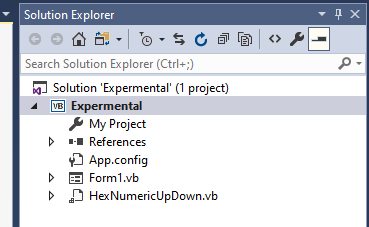Visual Studio 2017 and 2019, using VB.NET, will not load Form with HexNumericUpDown, modified NumericUpDown, control in it when CompileTarget CPU is x64.
I converted some C# code (from answer to "numericUpDown Hexadecimal bug") to VB which is listed below. Visual Studio 2017 using VB.NET, will not load the Form with a HexNumericUpDown, modified NumericUpDown, control in it when Compile Target CPU is "x64". I use this control to display Uint64 values in hex.
I add the following code to my project "Expermental" and compiled it with Compile Target CPU as "Any". Then add HexNumericUpDown to Form1 from the toolbox. Compiled it again use Compile Target of "x64". Then when I try to edit Form1.vb [Design] I get the following error messages:
To prevent possible data loss before loading the designer, the following errors must be resolved:
- "Could not find type 'Expermental.HexNumericUpDown'. Please make sure that the assembly that contains this type is referenced. If this type is a part of your development project, make sure that the project has been successfully built using settings for your current platform or Any CPU."
- "The variable 'HexNumericUpDown1' is either undeclared or was never assigned."
The control seems to work ok when I run it, but I can't edit the form unless set the Compile Target CPU back to "Any" and compile it again. This is driving me nuts. I also tried Visual Studio 2019 with the same results.
Is there a way to fix this?
Imports System.ComponentModel
Imports System.Windows.Forms
Friend Class HexNumericUpDown
Inherits NumericUpDown
Public Sub New()
MyBase.Hexadecimal = True
MyBase.Minimum = 0
MyBase.Maximum = UInt64.MaxValue
End Sub
<DesignerSerializationVisibility(DesignerSerializationVisibility.Hidden)> _
Public Shadows Property Maximum() As Decimal
' Doesn't serialize properly
Get
Return MyBase.Maximum
End Get
Set(ByVal value As Decimal)
MyBase.Maximum = value
End Set
End Property
Protected Overrides Sub UpdateEditText()
If MyBase.UserEdit Then
HexParseEditText()
End If
If Not String.IsNullOrEmpty(MyBase.Text) Then
MyBase.ChangingText = True
MyBase.Text = String.Format("{0:X}", CULng(Math.Truncate(MyBase.Value)))
End If
End Sub
Protected Overrides Sub ValidateEditText()
HexParseEditText()
UpdateEditText()
End Sub
Private Sub HexParseEditText()
Try
If Not String.IsNullOrEmpty(MyBase.Text) Then
Me.Value = Convert.ToUInt64(MyBase.Text, 16)
End If
Catch
Finally
MyBase.UserEdit = False
End Try
End Sub
End Class


